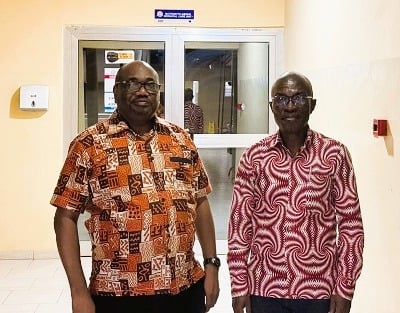Cervical cancer, a preventable and treatable disease, poses a significant global health challenge, particularly in developing countries. The World Health Organization has set a target for cervical cancer elimination by 2030, a goal achievable through concerted efforts focused on prevention, early detection, and timely treatment. Dr. Lawrence Kumi, CEO and Medical Director of Caritas Christi Hospital in Ho, Volta Region, Ghana, emphasizes the critical role of screening in achieving this objective. Early detection through screening allows for prompt intervention, significantly increasing the chances of successful treatment and survival. He encourages young women, a particularly vulnerable demographic, to overcome any fear or hesitation and actively participate in screening programs. Dr. Kumi highlights the cost-effectiveness of preventative measures like HPV vaccination and the treatment of pre-cancerous lesions, underscoring their importance in the fight against cervical cancer.
The urgency of addressing cervical cancer requires a multi-faceted approach involving various stakeholders. Communication for Development and Advocacy Consult (CDA Consult), a non-governmental organization, has launched a national advocacy campaign to combat cervical cancer in Ghana. This initiative aims to galvanize health professionals, human rights advocates, gender activists, religious leaders, and communication practitioners to collaborate in a comprehensive effort. The campaign recognizes the progress made in raising awareness but emphasizes the need for intensified action as the 2030 deadline approaches. Dr. Kumi supports this endeavor, urging corporate entities to contribute to the cause and emphasizing the importance of disseminating information about cervical cancer prevention.
CDA Consult’s advocacy campaign encompasses several key components: promoting free HPV vaccination, conducting public education initiatives, and encouraging screening, diagnosis, and treatment. The organization is committed to drawing global attention to the slow progress towards the 2030 target and advocating for accelerated action. Under the banner “Ghana Must Rise Against Cervical Cancer,” the campaign seeks to mobilize national efforts towards free vaccination, advocacy, and improved prevention, detection, and treatment strategies. The campaign employs region-specific slogans and strategies to enhance public education and engagement at the local level.
CDA Consult’s approach recognizes the importance of tailoring communication strategies to specific regions and demographics. By working closely with regional health professionals, the organization aims to disseminate crucial information about cervical cancer prevention, screening, and treatment throughout various districts. This localized approach ensures that the message reaches diverse communities and addresses specific cultural contexts, maximizing its impact and effectiveness. The campaign’s success hinges on widespread community participation and engagement, particularly among young women.
Preventive measures, particularly vaccination, are crucial in the fight against cervical cancer. Ms. Jennifer Nelson, a Preventive and Occupational Health Management Consultant and CEO of Lifeline Haven Company Limited, stresses the importance of HPV vaccination for girls between the ages of 9 and 14, ideally before they become sexually active. Vaccination during this age range provides optimal protection against HPV infection, significantly reducing the risk of cervical cancer and other related malignancies. Ms. Nelson emphasizes the critical role of public awareness campaigns and readily accessible resources in preventing and managing cervical cancer throughout a person’s life.
In conclusion, eliminating cervical cancer by 2030 requires a multifaceted, collaborative approach. Early detection through screening, coupled with preventative measures like HPV vaccination, plays a crucial role in improving treatment outcomes and survival rates. CDA Consult’s national advocacy campaign in Ghana exemplifies the importance of engaging diverse stakeholders, including health professionals, community leaders, and the corporate sector. By promoting free vaccination, conducting public education initiatives, and encouraging screening and early treatment, the campaign aims to accelerate progress towards the 2030 elimination target. The campaign’s emphasis on region-specific strategies and collaboration with local health professionals ensures effective communication and community engagement. Ultimately, success hinges on empowering individuals with knowledge and access to resources, enabling them to make informed decisions about their health and contribute to the global fight against cervical cancer.














